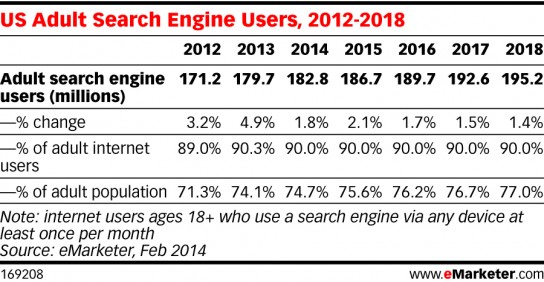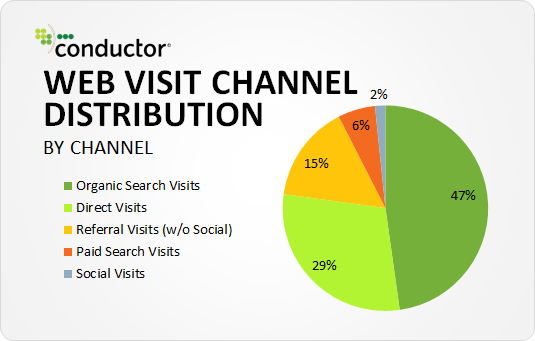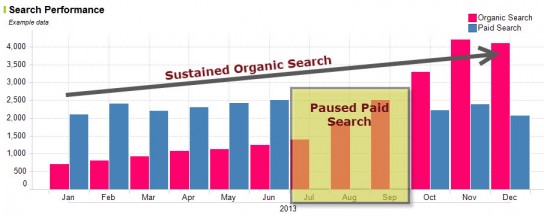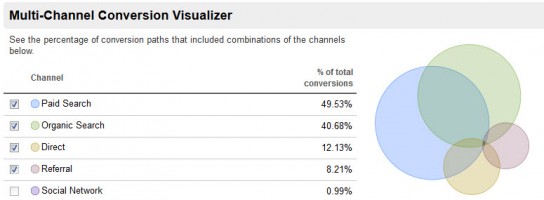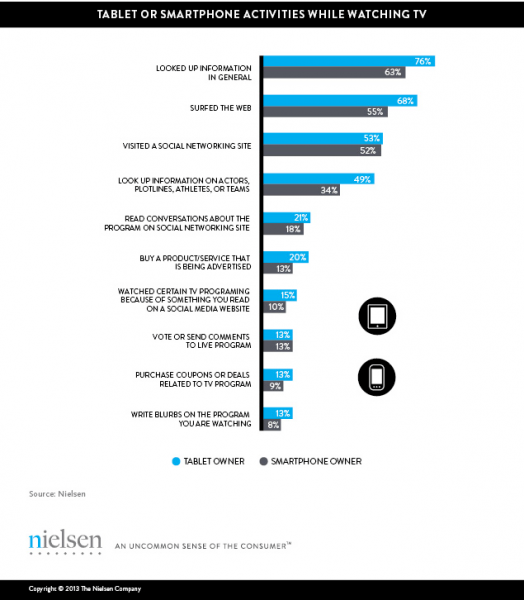The Value of Investing in Organic Search
February 26, 2014In 2013, there were approximately 5.9 billion Google searches conducted every day, which is up 15% compared to 2012. Additionally, eMarketer reports that a staggering 90% of U.S. adult internet users used a search engine in 2013.
These numbers alone should force you to realize the opportunity in organic search. Without SEO, brands will be unable to successfully compete in a crowded digital landscape and will stunt their ability to…
- Maximize website traffic
- Expand visibility to new consumers
- Efficiently run paid search campaigns
- Deliver a user-friendly experience to all visitors
- Execute a holistic digital strategy
Size of Traffic Opportunity –
Organic search is the largest driver of website traffic (47% of all visits, reported by Conductor in 2013). Why invest time, money, and resources into building a beautiful website and then hinder your ability to maximize inbound traffic by ignoring organic search?
Additionally, our own research tells us that 48% of search queries result in a click of a first page organic search listing, with the other 52% being distributed amongst paid clicks and search abandonment.
User Behavior / Trust Factor –
Many consumers perceive organic search results as more authentic, as these listings are not achieved through paid placement. As a result, searchers will often times be more easily influenced by the page content when driven via organic search.
Engaging in technical optimization is a necessary component of basic website maintenance and helps improve user experience for all visitors (e.g. via direct, referral, social channels), not just organic search. Technical SEO elements include fixing broken links, reduce page load speeds and crafting a proper site structure. All of these contribute to a user-friendly website.
Sustainable/Long Term Traffic Source –
While SEO tactics can take 6+ months to yield favorable search performance, once achieved, organic traffic generally can be counted on as a substantial and long term traffic driver. With a little maintenance, organic search can become a sustainable source of traffic.
On the flip side, paid search (and traditional advertising) can drive traffic immediately, but they’re limited by budgets. Additionally, inbound traffic stops the moment you halt the campaign.
Expand Your Visibility Beyond The Brand –
Without quality content that has been optimized for organic search, your site will likely only be found by consumers searching for keywords relating to your brand equity (e.g. brand name, sub-brand names and slogans). This means that without SEO you have minimal ability to reach consumers who are high in the purchasing funnel, and who have not yet considered your brand (or your competitors).
Additionally, without optimized content, you can’t efficiently leverage PPC and bid on any unbranded informational queries.
Lower CPCs in Paid Campaigns –
A properly optimized webpage is extremely relevant for its keyword target(s), thus improving the page’s Quality Score (a metric used by Google that influences the cost per click and ad position). A higher Quality Score typically leads to lower Paid search costs and better ad positions.
Major Contributor to Driving conversions –
More often than not, consumers do not purchase after engaging with just one digital touch point. This is because they can be at different phases along their path to purchase – moving from discovery to education to consideration and finally to purchase. As a result, a sale is usually not a single event and thus must be attributed to multiple channels. Organic search can be a major contributor along the consumer’s path to conversion.
- eMarketer reports that 90% (179.7MM) of adult internet users used a search engine in 2013.
- 61% of online shoppers use the web for the research phase of online purchasing (Interconnected World: Shopping and Personal Finance – 2012)
- 39% of ecommerce customers were acquired via search engines (MarketLive – 2012)
Furthermore, organic search allows you to deliver consistent messaging across all marketing channels, creating a holistic strategy and more effectively connecting offline and online.
In a 2013 publication, Nielsen reported that 43% of tablet users used their devices as second screens while watching TV every day, with 76% of those users performing web searches and 20% to buy a product being advertised. This presents a huge opportunity to deliver a streamlined marketing approach, connecting offline with online channels.
Final Word
As you can see there are multiple reasons marketers must invest in SEO as it can be a long term traffic source, help you reach new customers, and can assist in with other digital channels. Might I suggest bookmarking this post, and saving it for the next time you need to convince your manager to allocate some resources towards SEO :).
Please let me know if you agree/disagree, or if I missed anything, in the comments below.

